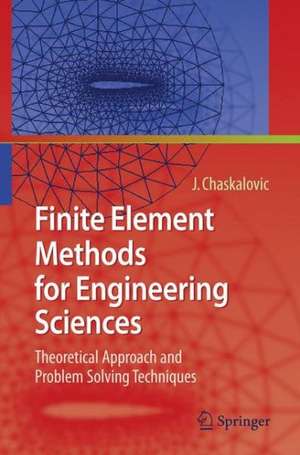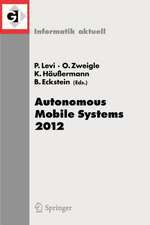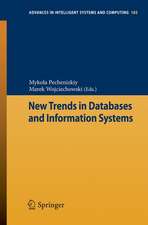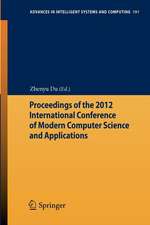Finite Element Methods for Engineering Sciences: Theoretical Approach and Problem Solving Techniques
Autor Joel Chaskalovicen Limba Engleză Paperback – 19 oct 2010
| Toate formatele și edițiile | Preț | Express |
|---|---|---|
| Paperback (1) | 331.08 lei 6-8 săpt. | |
| Springer Berlin, Heidelberg – 19 oct 2010 | 331.08 lei 6-8 săpt. | |
| Hardback (1) | 337.85 lei 6-8 săpt. | |
| Springer Berlin, Heidelberg – oct 2008 | 337.85 lei 6-8 săpt. |
Preț: 331.08 lei
Preț vechi: 413.85 lei
-20% Nou
Puncte Express: 497
Preț estimativ în valută:
63.36€ • 65.65$ • 52.88£
63.36€ • 65.65$ • 52.88£
Carte tipărită la comandă
Livrare economică 21 martie-04 aprilie
Preluare comenzi: 021 569.72.76
Specificații
ISBN-13: 9783642095207
ISBN-10: 3642095208
Pagini: 268
Ilustrații: XII, 255 p. 35 illus.
Dimensiuni: 155 x 235 x 14 mm
Greutate: 0.38 kg
Ediția:Softcover reprint of hardcover 1st ed. 2009
Editura: Springer Berlin, Heidelberg
Colecția Springer
Locul publicării:Berlin, Heidelberg, Germany
ISBN-10: 3642095208
Pagini: 268
Ilustrații: XII, 255 p. 35 illus.
Dimensiuni: 155 x 235 x 14 mm
Greutate: 0.38 kg
Ediția:Softcover reprint of hardcover 1st ed. 2009
Editura: Springer Berlin, Heidelberg
Colecția Springer
Locul publicării:Berlin, Heidelberg, Germany
Public țintă
GraduateCuprins
Summary of Courses on Finite Elements.- Some Fundamental Classes of Finite Elements.- Variational Formulations.- Finite Elements in Deformable Solid Body Mechanics.- Finite Elements Applied to Strength of Materials.- Finite Elements Applied to Non Linear Problems.
Recenzii
From the reviews:
"This is a textbook devoted to finite element methods (FEMs). … As a whole, this book is an introductory tutorial from mathematical standpoint, convenient for students with moderate mathematical knowledge and training." (Fumio Kikuchi, Zentralblatt MATH, Vol. 1160, 2009)
"This book addresses a very popular topic, finite element methods (FEM)--a powerful engineering tool. The availability of commercial FEM software allows engineers and researchers to get approximate results for many engineering problems that are hardly solved by a pure theoretical approach. … This book will be a very useful theoretical reference for people who are trying to develop a new type of finite element. … Summing Up: Recommended. … upper-division undergraduates through professionals with a strong mathematical background." (X. Le, Choice, Vol. 46 (11), 2009)
"This is a textbook devoted to finite element methods (FEMs). … As a whole, this book is an introductory tutorial from mathematical standpoint, convenient for students with moderate mathematical knowledge and training." (Fumio Kikuchi, Zentralblatt MATH, Vol. 1160, 2009)
"This book addresses a very popular topic, finite element methods (FEM)--a powerful engineering tool. The availability of commercial FEM software allows engineers and researchers to get approximate results for many engineering problems that are hardly solved by a pure theoretical approach. … This book will be a very useful theoretical reference for people who are trying to develop a new type of finite element. … Summing Up: Recommended. … upper-division undergraduates through professionals with a strong mathematical background." (X. Le, Choice, Vol. 46 (11), 2009)
Textul de pe ultima copertă
This self-tutorial offers a concise yet thorough grounding in the mathematics necessary for successfully applying FEMs to practical problems in science and engineering. The unique approach first summarizes and outlines the finite-element mathematics in general and then, in the second and major part, formulates problem examples that clearly demonstrate the techniques of functional analysis via numerous and diverse exercises. The solutions of the problems are given directly afterwards. Using this approach, the author motivates and encourages the reader to actively acquire the knowledge of finite- element methods instead of passively absorbing the material, as in most standard textbooks. The enlarged English-language edition, based on the original French, also contains a chapter on the approximation steps derived from the description of nature with differential equations and then applied to the specific model to be used. Furthermore, an introduction to tensor calculus using distribution theory offers further insight for readers with different mathematical backgrounds.
Caracteristici
Self-learning and self-tutorial pedagogical book written in an easy-to-learn way Provides Students of various Engineering disciplines and maths the mathematical Basis of Finite Element Methods Unique teaching method which explains the analysis using exercises and detailed solutions Ideal for autodidacts Enables active learning Includes supplementary material: sn.pub/extras
















